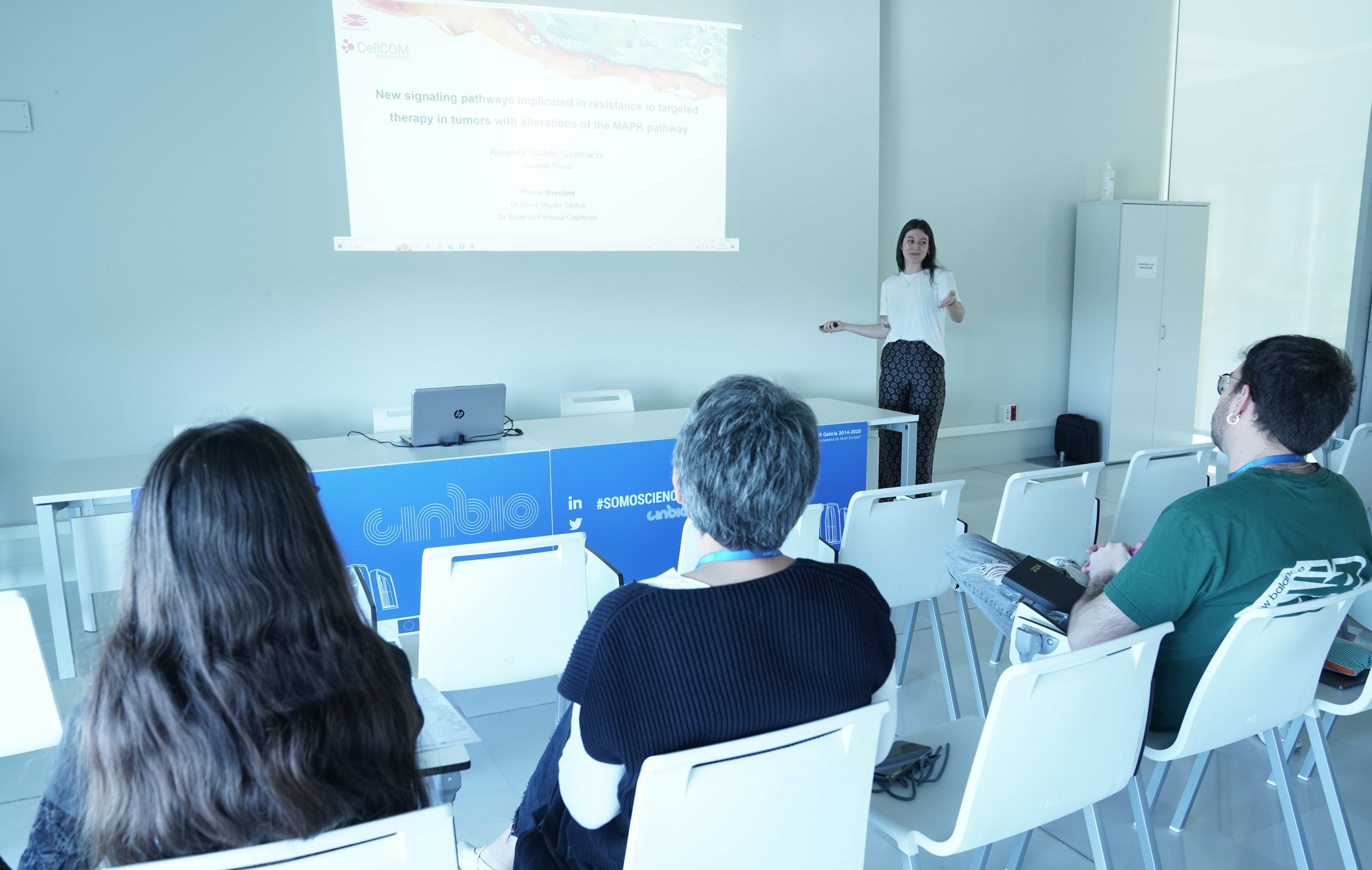Eventos
O mércores 29 de maio ás 11:00 horas teremos a oportunidade de coñecer o traballo de Amanda Guitián Caamaño, do grupo CellCOM do CINBIO, que impartirá a charla "New signaling pathways implicated in resistance to targeted therapy in tumors with alterations of the MAPK pathway" dentro do ciclo "Coñece ao #teamCINBIO".
Será de xeito presencial na Sala de seminarios da Torre CACTI.

ABSTRACT:
Mutations in the oncogenic protein kinase BRAF are associated with a wide range of cancers, in particular over 50% of melanoma cases and approximately 8% of all cancers worldwide. While BRAF/MEK inhibitors (BRAF/MEKi) are the standard of care for BRAF-mutant melanoma, their efficacy is limited by drug resistance. The channel protein connexin43 (Cx43) is known to facilitate small molecule exchange and act as a potential tumour suppressor in primary melanoma, although its role in disease progression is controversial.
Our project aims to investigate the role of Cx43 in BRAF-mutant cancers and resistance to therapy. Our findings suggest that Cx43 enhances the efficacy of BRAF/MEKi in BRAF-driven tumours by attracting DNA repair complexes to the nuclear membrane, thereby restricting homologous recombination pathways, delaying DNA repair and inducing genome instability and synthetic lethality. Targeting Cx43 to interfere with DNA repair may increase treatment efficacy and overcome drug resistance in BRAF-mutant tumours.
In light of our findings, we designed an innovative drug combination using extracellular vesicles (EVs) as a drug delivery system to deliver the complete Cx43 in combination with the BRAF/MEKi. Cx43 increases EVs internalisation and modifies their cargo, thereby affecting the physiological functions of tumour receptor cells. In addition, Cx43 affects tumour cell metabolism by increasing mitochondrial content and respiratory capacity in BRAFV600E melanoma cells by regulating endoplasmic reticulum (ER) stress pathways, potentially inducing cell death.
Overall, our study highlights novel functions of Cx43, demonstrating for the first time that Cx43 is a novel factor contributing to DNA repair response and BRAF/MEKi efficacy, as well as a key player in the regulation of ER stress, highlighting the potential of Cx43 as an antitumour agent and enhancer of therapy efficacy, as well as a bypass for drug resistance acquisition in BRAF-mutant tumours.

BIO:
Amanda Guitián Caamaño, nacida en A Coruña, se graduó en Biología en junio de 2017 por la Universidad de A Coruña. Posteriormente, realizó un máster en Investigación Biomédica en la misma universidad, dentro del grupo CellCOM. Decidió continuar su carrera investigadora dentro del mismo grupo en el campo de las conexinas, enfocándose en su papel como estrategia terapéutica en tumores con mutaciones en la vía de las MAPK.
Entre 2018 y 2024, llevó a cabo su tesis doctoral bajo la supervisión de la Dra. María Mayán en el Instituto de Investigación Biomédica de A Coruña (INIBIC). Durante este periodo, participó activamente en varios proyectos del grupo, adquiriendo conocimientos y experiencia en diversas técnicas. Se especializó en el uso de exosomas como nanovehículos para la liberación de fármacos y en el estudio del metabolismo y función mitocondrial de células tumorales. Sus resultados han sido presentados en más de 20 congresos nacionales e internacionales y han sido fundamentales para la licencia de una patente europea (PCT/EP2021/077487).
Además, ha establecido varias colaboraciones para enriquecer sus investigaciones y ha realizado estancias de investigación en prestigiosos laboratorios como el MRC-LMB de Cambridge, bajo la supervisión de la Dra. Patrycja Kozik, así como en el CIB Margarita Salas y el CiMUS, bajo la supervisión de la Dra. Aurora Gómez Durán.
Ha participado activamente en numerosas actividades de divulgación científica, incluyendo charlas en colegios de primaria y secundaria o eventos organizados por la AECC y la fundación Corbi. También ha colaborado en la organización de la reunión anual del IYI meeting y de las jornadas Science Xpression desde 2018. Es embajadora de ASEICA, participando regularmente en sus proyectos divulgativos y científicos, y colabora activamente con otras asociaciones como la SEBBM.





